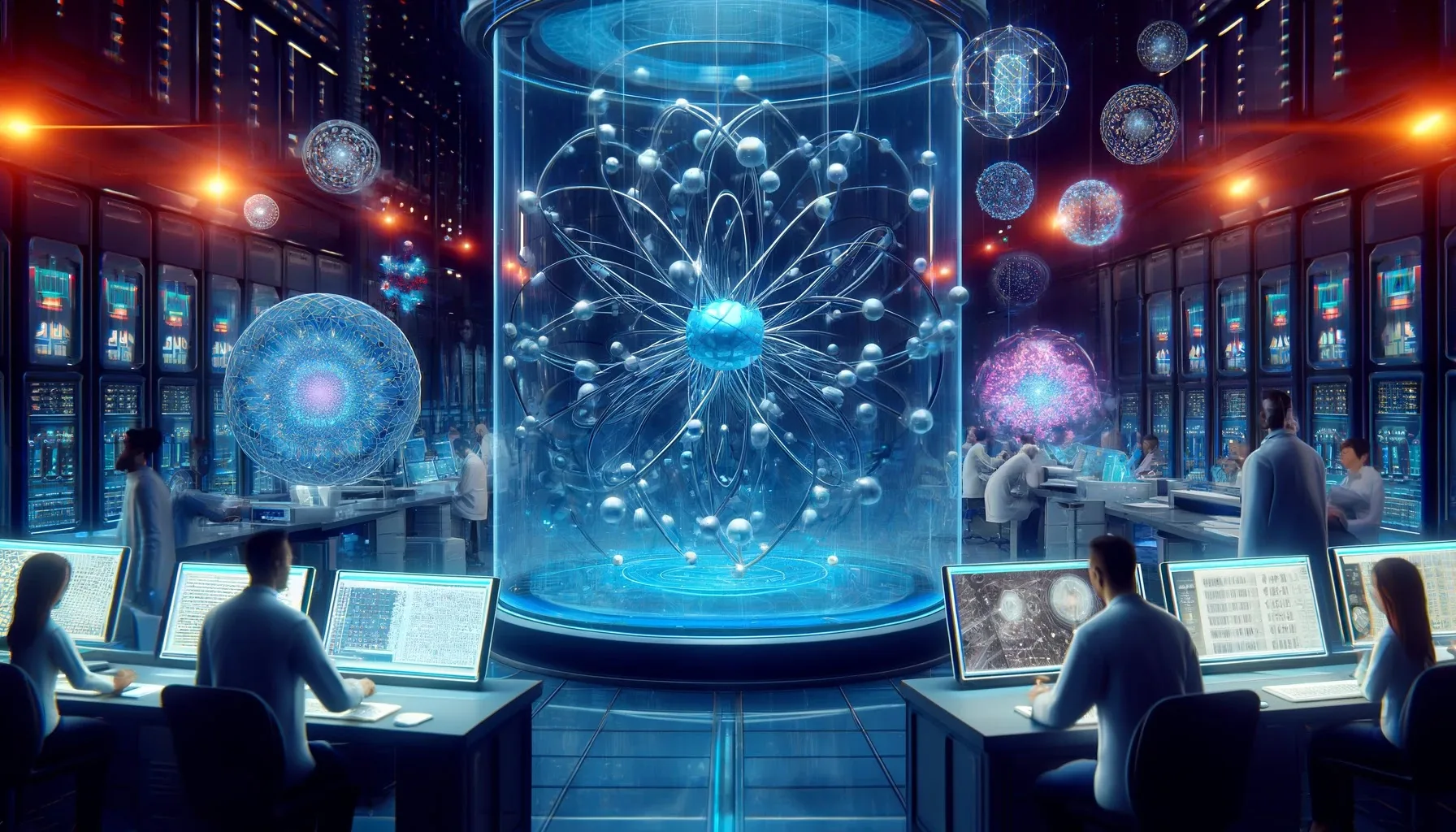INSURANCE
maxtechonline.com artificial intelligence quantum computing

maxtechonline.com artificial intelligence quantum computing maxtechonline.com artificial intelligence quantum computingIn recent years, two groundbreaking technologies have been making waves in the tech world: artificial intelligence (AI) and quantum computing. Both have the potential to revolutionize the way we live, work, and interact with the world around us. While AI is already embedded in many aspects of modern life, quantum computing is still in its early stages but promises to bring about even more profound changes. In this article, we will explore the intricacies of AI and quantum computing, their relationship, potential applications, and how they are shaping the future.
Artificial Intelligence: A Brief Overview
Artificial intelligence is not a new concept. Its roots can be traced back to the mid-20th century when computer scientists began developing machines that could mimic human intelligence. AI refers to systems or machines that can perform tasks that typically require human intelligence. These tasks include learning, reasoning, problem-solving, understanding natural language, and perception.
Categories of AI
AI can be broadly divided into three categories:
- Artificial Narrow Intelligence (ANI): This is the most common form of AI and is designed to perform specific tasks, such as speech recognition or image processing. ANI systems can outperform humans in these particular tasks but cannot perform outside their predefined area of expertise. Examples of ANI include Siri, Google Assistant, and autonomous vehicles.
- Artificial General Intelligence (AGI): AGI refers to systems that possess the ability to understand, learn, and apply intelligence across a wide range of tasks, much like a human being. AGI is still theoretical and has not been achieved yet. If realized, AGI could transform industries, from healthcare to robotics, due to its potential to replicate human cognitive abilities.
- Artificial Superintelligence (ASI): ASI goes beyond human capabilities, potentially surpassing human intelligence in every field, including scientific research, social skills, and even creative thinking. While ASI remains a distant concept, it raises significant ethical and existential questions.
How AI Works
The core of AI lies in machine learning (ML), a subset of AI that enables systems to learn from data without being explicitly programmed. In machine learning, algorithms are used to identify patterns and make decisions based on data inputs. Over time, the system improves its performance as it is exposed to more data.
Deep learning, a more advanced form of machine learning, involves the use of artificial neural networks, modeled after the human brain. These networks allow systems to process massive amounts of data through multiple layers, enabling them to recognize complex patterns and make accurate predictions.
AI in the Real World
AI has already made significant impacts across various industries:
- Healthcare: AI systems are used for medical imaging, diagnostics, personalized treatment plans, and drug discovery. For instance, AI algorithms can analyze medical scans to detect early signs of diseases such as cancer with high accuracy.
- Finance: In the finance sector, AI is utilized for fraud detection, risk management, and automated trading. Algorithms analyze market trends and execute trades faster than any human trader.
- Automotive Industry: AI is a key component in the development of self-driving cars. Autonomous vehicles rely on AI to process real-time data from sensors and make decisions to ensure safe navigation.
- Retail: AI-driven chatbots provide customer service, while recommendation algorithms enhance the shopping experience by suggesting products based on user preferences.
AI is increasingly present in everyday life, from smart assistants like Alexa and Siri to recommendation engines on platforms such as Netflix and Amazon.
Quantum Computing: A Paradigm Shift
While artificial intelligence continues to evolve, another technology—quantum computing—promises to push the boundaries of what is possible in computing power. Unlike classical computers, which process data in binary (0s and 1s), quantum computers operate on the principles of quantum mechanics, which govern the behavior of particles at the smallest scales.
How Quantum Computing Works
At the core of quantum computing is the quantum bit (qubit). In classical computing, a bit can only exist in one of two states: 0 or 1. However, qubits can exist in multiple states simultaneously due to a phenomenon called superposition. This ability to exist in multiple states allows quantum computers to perform calculations much faster than classical computers.
Another key concept in quantum computing is entanglement, where qubits become interconnected in such a way that the state of one qubit directly affects the state of another, even if they are separated by great distances. This entanglement enables quantum computers to process and transfer information in ways that classical computers cannot.
The Power of Quantum Computing
The unique properties of qubits—superposition and entanglement—give quantum computers their immense power. These computers can solve complex problems that are practically impossible for classical computers to handle. For example, they can factorize large numbers, optimize complex systems, and simulate molecular interactions in ways that were previously unimaginable.
However, building and maintaining a quantum computer is no easy task. Qubits are extremely delicate and must be kept in highly controlled environments to avoid interference from external factors (called decoherence). As a result, quantum computers are still in their early stages, with many companies and research institutions working to overcome these technical challenges.
Real-World Applications of Quantum Computing
Quantum computing has the potential to transform industries by solving problems that classical computers struggle with:
- Cryptography: Quantum computers could break current encryption methods, which rely on the difficulty of factoring large numbers. However, quantum cryptography also offers new ways to create unbreakable encryption by using the principles of quantum mechanics.
- Drug Discovery: Quantum computers could revolutionize the pharmaceutical industry by simulating molecular structures and interactions at an atomic level, speeding up the discovery of new drugs and treatments.
- Supply Chain Optimization: Businesses can use quantum computing to optimize complex logistics and supply chains, making them more efficient and cost-effective.
- Climate Modeling: Quantum computers could improve climate modeling by processing vast amounts of data to predict weather patterns and assess the impact of climate change with unprecedented accuracy.
- Artificial Intelligence: One of the most promising applications of quantum computing is in AI. Quantum computers can enhance machine learning algorithms by speeding up the training process and improving the accuracy of predictions.
The Intersection of Artificial Intelligence and Quantum Computing
While AI and quantum computing are distinct technologies, their intersection holds enormous potential. The combination of AI’s ability to process and analyze data with the computational power of quantum computers could lead to breakthroughs in fields ranging from healthcare to finance.
Quantum AI: Accelerating Machine Learning
Quantum computing can revolutionize machine learning, one of the core components of AI. Quantum machine learning algorithms have the potential to process and analyze data more quickly than classical algorithms. For example, quantum computers can solve optimization problems much faster, leading to quicker training times for AI models.
Additionally, quantum computers can handle large datasets with many variables, which is particularly useful for AI systems that rely on deep learning. By speeding up the training process and improving the accuracy of AI models, quantum computing can accelerate the development of more advanced AI systems.
AI in Quantum Computing Development
On the flip side, AI can also play a crucial role in the development of quantum computers. Quantum systems are incredibly complex, and researchers are using AI algorithms to optimize quantum circuits, error correction methods, and other technical aspects of quantum computing. AI-driven tools can help researchers identify patterns and make improvements that would be difficult to achieve manually.
Practical Applications of Quantum AI
The integration of AI and quantum computing opens the door to a wide range of practical applications:
- Healthcare: AI-driven quantum computers could analyze massive amounts of patient data to develop personalized treatment plans, predict disease outbreaks, and accelerate drug discovery.
- Financial Modeling: In finance, quantum AI could optimize investment strategies, manage risk, and enhance trading algorithms by processing complex market data at unprecedented speeds.
- Natural Language Processing: Quantum AI could revolutionize natural language processing by improving the ability of machines to understand and generate human language. This could enhance chatbots, virtual assistants, and translation tools.
- Robotics: Quantum AI could advance the field of robotics by enabling robots to learn and adapt to their environments more quickly and efficiently.
Challenges and Ethical Considerations
Despite the immense potential of AI and quantum computing, there are significant challenges that must be addressed.
Technical Challenges
For AI, challenges include:
- Bias in AI Systems: AI systems can develop biases if trained on biased data, leading to unfair or inaccurate outcomes.
- Data Privacy: The use of AI to analyze personal data raises concerns about privacy and data security.
In quantum computing, the primary challenge is the decoherence of qubits, which makes it difficult to maintain stable quantum states for long periods. Additionally, quantum computers are currently expensive and require highly specialized environments.
Ethical Concerns
Both AI and quantum computing raise ethical questions:
- Job Displacement: As AI and quantum computing become more advanced, there is concern that they will replace jobs across various industries, leading to unemployment and social unrest.
- Existential Risks: The development of AGI and ASI poses existential risks if machines surpass human intelligence and begin making decisions that could harm humanity.
- Security Risks: Quantum computing could break existing encryption methods, posing a threat to data security. Governments and companies must develop new encryption techniques to protect sensitive information.
The Future of AI and Quantum Computing
The future of AI and quantum computing is incredibly promising. As these technologies continue to advance, they will play an increasingly important role in shaping industries, economies, and societies. However, it is essential to address the technical, ethical, and societal challenges that come with them to ensure they are used for the benefit of all.
Conclusion
AI and quantum computing represent the next frontier
INSURANCE
Shelley covel rowland

Shelley Covel Rowland is a name that resonates with creativity and passion in the music industry. Often recognized for her unique contributions, she has carved out a distinct niche that combines talent with authenticity. As an artist, songwriter, and performer, Shelley’s influence extends beyond the stage; her journey reflects personal growth and unwavering dedication to her craft. Whether you’re a die-hard fan or just discovering her work, there’s much to uncover about this remarkable figure who continues to inspire many through her artistry and philanthropic efforts. Let’s dive into the life of Shelley Covel Rowland and explore what makes her such a captivating presence in today’s music landscape.
Early Life and Education
Shelley Covel Rowland was born into a musical family, which sparked her passion for music at an early age. Growing up in the vibrant atmosphere of Southern California, she often found herself surrounded by melodies and harmonies that shaped her artistic journey.
Her education played a crucial role in honing her talents. Shelley pursued studies in both music and performing arts, immersing herself in various genres and styles. This diverse training helped her develop a unique sound that would later captivate audiences.
Throughout her school years, she participated in numerous talent shows and local performances. These experiences not only built her confidence but also allowed her to connect with other aspiring musicians. Each step during this formative period laid the groundwork for what would become an impressive career in the music industry.
Career Highlights and Achievements
Shelley Covel Rowland boasts a captivating career in the music industry. Known for her incredible vocal talent, she has made significant contributions to country music, particularly through collaboration with famed artists.
Her debut album showcased not only her singing prowess but also her songwriting skills. This dual talent set her apart and garnered attention from both fans and critics alike.
Rowland’s performances have captivated audiences worldwide. She is celebrated for bringing heartfelt emotion into each song, creating an unforgettable experience for listeners.
In addition to her solo work, Shelley has participated in various charity concerts. Her commitment to social causes highlights her dedication beyond just music.
The awards she’s received reflect recognition within the industry. Each accolade underscores her influence while inspiring up-and-coming musicians who look up to her as a role model.
Impact on the Music Industry
Shelley Covel Rowland has made significant waves in the music industry, particularly through her work as a songwriter. Her unique blend of storytelling and emotion resonates with audiences, making her contributions memorable.
She is also known for collaborating with various artists across genres, bringing fresh perspectives to their projects. This versatility has allowed her to bridge gaps between different musical styles while enriching the creative landscape.
Rowland’s influence extends beyond just songwriting; she inspires aspiring musicians to pursue their dreams relentlessly. Her journey underscores the importance of authenticity in art, encouraging others to embrace their voices.
Furthermore, Shelley actively participates in initiatives that support emerging talent within the industry. By mentoring young artists and sharing her insights, she fosters an environment where creativity can flourish without boundaries.
Personal Life and Philanthropy Work
Shelley Covel Rowland leads a life that balances her public persona with personal passions. Known for her down-to-earth nature, she values family and friendships deeply. Her close-knit relationships often shine through in interviews where she speaks candidly about the joys and challenges of balancing work and home life.
Philanthropy is a significant part of Shelley’s world. She actively supports various charities focused on education, health care, and the arts. Whether it’s fundraising events or community outreach programs, she dedicates her time to making a difference.
Her commitment extends beyond financial contributions; Shelley often volunteers directly with organizations. This hands-on approach reflects her belief in creating tangible change in people’s lives—an ethos that resonates throughout everything she does.
Through these efforts, Shelley inspires others to give back while remaining true to herself amid the spotlight’s glare.
Legacy and Influence
Shelley Covel Rowland’s impact reaches far beyond her music. As a talented singer-songwriter, she has inspired countless artists in the country genre and beyond. Her unique sound blends traditional elements with contemporary flair, creating a ripple effect throughout the industry.
Many emerging musicians cite her as a significant influence on their work. Shelley’s authenticity resonates deeply with fans and fellow artists alike, encouraging them to embrace their individuality.
Additionally, her philanthropic efforts have left an indelible mark on communities. By advocating for various causes through her platform, Shelley amplifies voices that often go unheard.
Her commitment to social issues further solidifies her role not just as an artist but as a change-maker in society. The legacy of Shelley Covel Rowland continues to thrive through those she inspires and the positive changes she fosters in the world around her.
Conclusion
Shelley Covel Rowland is more than just a name in the music industry; she embodies the spirit of creativity and resilience. Her early life laid a foundation that would propel her into a remarkable career, filled with achievements that continue to inspire many. From her impactful contributions to the country music scene to her philanthropic endeavors, Shelley has made significant strides both personally and professionally.
Her influence extends beyond chart-topping songs. She has shaped trends and inspired countless artists who look up to her journey as proof of what determination can achieve. Shelley’s legacy is one that will resonate for years, leaving an indelible mark on fans and aspiring musicians alike.
With every note she plays and every cause she supports, Shelley Covel Rowland continues to be a beacon of hope in the music world. The story she’s woven through hard work and passion serves as an inspiration for anyone daring enough to chase their dreams while making a difference along the way.
INSURANCE
lrtsjerk: The Secret Ingredient for Success?

Would you like to know what the one thing is that can speed up your success rate? Envision a tremendous instrument that may revolutionize your life and help you achieve your ambitions. The key to realizing your greatest potential lies in lrtsjerk, an enigmatic but powerful force. This blog post will teach you where lrtsjerk came from, what it can do for you, and how to use it to your advantage. With lrtsjerk, you are about to begin an exciting adventure of self-discovery and success.
What is lrtsjerk and where did it come from?
Does lrtsjerk sound familiar to you? This seemingly fictitious term actually contains the secret to your personal and professional success. A potent instrument for self-improvement, Lrtsjerk is an original idea that combines elements of both traditional knowledge and cutting-edge scientific inquiry.
Lrtsjerk is all about bettering yourself by learning new things, being resilient, managing your time wisely, and having specific goals to strive toward. The idea that self-awareness and self-control are important to achieving one’s goals is thought to have originated in Eastern philosophies.
Incorporating lrtsjerk into your everyday routine can assist you in gracefully and determinedly navigating today’s fast-paced environment. An individual’s ability to concentrate, output, and success can all be improved by adopting a “lrtsjerk” mentality.
Applying the concepts of lrtsjerk can help you overcome obstacles and achieve achievement the next time you feel overwhelmed or trapped.
The Benefits of lrtsjerk for Success
Envision yourself equipped with a hidden tool that could facilitate your seamless ascent to the top. In this regard, lrtsjerk serves as an invaluable asset, a hidden treasure that can expedite your progress toward your objectives.
A notable advantage of lrts,jerk is that it enhances concentration and productivity. Your alertness, motivation, and ability to handle any obstacles that come your way will be much enhanced by adding lrts,jerk to your regular routine.
Also, lrts,jerk can help you think more creatively and solve problems more efficiently. A fresh outlook and ground-breaking ideas can emerge, giving you a leg up on the competition.
Also, lrtsjerk can help you feel better mentally and emotionally by lowering your stress levels. Once you gain mental clarity and strengthen your resilience, you’ll be more capable of effortlessly overcoming challenges.
Adding lrtsjerk to your routine can be the missing link in your quest for success.
How to Incorporate lrtsjerk into Your Life
Adding lrtsjerk to your regular regimen has the potential to revolutionize your game. First things first: picture yourself where you want to go and how lrtsjerk can assist you in getting there. These will serve as your goals and intentions.
Make sure to incorporate time for lrtsjerk activities like exercise, meditation, or writing into your regular agenda. The formation of new habits and the rewiring of the brain for success require consistency.
When you want to live your best life in accordance with the lrtsjerk principles, don’t be scared to attempt new things. Recognize that obstacles are merely stepping stones on the path to success and seize them as chances for personal development and education.
Success Stories of People Who Have Used lrtsjerk
Are the real-life success stories around lrts,jerk anything you’ve ever thought about? In any case, get ready to be motivated by stories of people who have used this hidden element to great effect.
Think about Sarah. A lack of inspiration and motivation had her mired in a rut at work. She reached new heights in her profession after integrating lrts,jerk into her daily routine, which resulted to an increase in productivity and creativity.
Then there’s Mark, who had a hard time believing in himself and was insecure. He was able to launch a thriving business and take chances he had never considered before after embracing the mind-altering effects of lrts,jerk.
These are only a handful of the many ways in which lrt,sjerk has changed the game for individuals who have been bold enough to use it. It only goes to show that when you have lrts,jerk on your side and the correct attitude. You can accomplish anything.
The Science Behind lrtsjerk and its Impact on the Brain
Do you ever find yourself pondering the enigmatic effects of lrtsjerk on our minds? Alright, then, let’s explore the scientific rationale of this fascinating idea.
According to studies, lrtsjerk makes you feel good and motivated by triggering the brain chemical dopamine. Mood, concentration, and cognitive abilities can all be improved by this spike in dopamine.
In addition, research has demonstrated that consistent lrtsjerk practice can remodel neural networks in the brain. Which in turn improves problem-solving and decision-making abilities. Over time, these connections are strengthened by the repeating nature of lrts,jerk.
Participating in lrts,jerk activities has also been associated with better health and less stress. You might feel more accomplished and have more creative ideas if you make lrts,jerk a part of your everyday routine.
Neuroscientists are still puzzling over the precise ways in which lrtsj,erk affects various brain areas and how these alterations show up in behavior. Remember that there’s an interesting scientific explanation for the affects on your thoughts of lrtsj,erk activities the next time you participate in them.
Conclusion
If you’re looking to up your success game, lrtsjerk is a must-have. You can change your perspective, increase your output, and move closer to your objectives with the help of this effective chemical. Get the most out of lrtsjerk by learning what it is, why it’s useful, and how to implement it properly. Why not give lrtsjerk a go and see if it can open doors to greater success in your personal and professional life? Put lrtsj,erk into practice right now and see your results skyrocket!
INSURANCE
Secure Your Peace of Mind with Openhouseperth.net Insurance

Welcome to the peace of mind zone with Openhouseperth.net Insurance! Your home is your sanctuary, a place where memories are made and cherished. But what happens when unexpected events like natural disasters, theft, or accidents threaten this haven? That’s where home insurance comes in to safeguard your most valuable asset. Let’s dive into why Openhouseperth.net Insurance should be your go-to choice for protecting your residence and ensuring tranquility in times of uncertainty.
Understanding the Importance of Home Insurance
When it comes to protecting your most valuable asset, your home, having insurance is crucial. Home insurance provides a safety net in case of unexpected events like natural disasters or theft. Without proper coverage, you could be left facing significant financial losses.
Home insurance not only protects the physical structure of your house but also covers personal belongings inside. Imagine having to replace all your possessions out of pocket after a fire – the costs can be overwhelming. With the right policy, you can have peace of mind knowing that you’re financially secure.
Additionally, many mortgage lenders require homeowners to have insurance as part of their loan agreement. It’s not just about safeguarding your investment; it’s often a legal requirement too.
Understanding the importance of home insurance is about being proactive and prepared for any unforeseen circumstances that may arise. Don’t wait until it’s too late – protect your home and everything in it with reliable coverage.
Coverage Options for Homeowners
When it comes to protecting your home, having the right insurance coverage is crucial. Openhouseperth.net Insurance offers a range of coverage options tailored to meet the specific needs of homeowners.
With Openhouseperth.net Insurance, you can choose from different policy options that provide protection against risks such as fire, theft, natural disasters, and liability claims. These policies are designed to give you peace of mind knowing that your home is safeguarded in case of unforeseen events.
Whether you own a house or a condominium, Openhouseperth.net Insurance has coverage solutions that can be customized to suit your property type and budget. You can rest easy knowing that your most valuable asset is protected with comprehensive insurance coverage from a trusted provider like Openhouseperth.net.
Additional Coverage for Valuables and Personal Belongings
When it comes to protecting your valuable possessions and personal belongings, Openhouseperth.net Insurance has you covered with additional coverage options. Your home insurance policy may not fully cover items like jewelry, art pieces, or collectibles, which is where this extra protection becomes invaluable.
With Openhouseperth.net Insurance, you can add specific coverage for high-value items that exceed the limits of your standard policy. This means peace of mind knowing that even your most precious belongings are protected in case of theft or damage.
Whether it’s a family heirloom passed down through generations or a newly acquired piece of fine art, having the right coverage ensures that you won’t have to worry about financial losses if something happens to these items. Protecting what matters most to you is essential, and Openhouseperth.net Insurance makes it easy to do just that.
Benefits of Openhouseperth.net Insurance
When it comes to protecting your home, Openhouseperth.net Insurance offers a range of benefits that provide peace of mind. One key advantage is the comprehensive coverage options available for homeowners, ensuring that you are financially protected in case of any unforeseen events such as natural disasters or theft.
Moreover, Openhouseperth.net Insurance also provides additional coverage for valuables and personal belongings, giving you the assurance that your most precious items are safeguarded. This extra layer of protection can be invaluable in times of need.
Another benefit of choosing Openhouseperth.net Insurance is their user-friendly process for getting a quote and signing up. With just a few simple steps, you can secure your home and possessions without any hassle.
Furthermore, customer testimonials speak volumes about the reliability and quality service provided by Openhouseperth.net Insurance. Knowing that others have had positive experiences can give you confidence in your decision to choose them as your insurance provider.
How to Get a Quote and Sign Up
Getting a quote and signing up for Openhouseperth.net Insurance is quick and easy. To start the process, simply visit their website and navigate to the quote section. Here, you will be asked to provide some basic information about your home, such as its location, size, and any additional features that may affect your coverage.
Once you have entered all the necessary details, you will receive a personalized quote tailored to your specific needs. Take your time reviewing the coverage options available to ensure they meet your requirements. If you have any questions or need assistance during this process, don’t hesitate to reach out to their customer service team for guidance.
When you are satisfied with the quote and ready to proceed, simply follow the prompts on the website to complete the sign-up process. You may be required to provide additional information at this stage before finalizing your policy. After completing these steps, congratulations – you are now covered by Openhouseperth.net Insurance!
Tips for Making the Most Out of Your Home Insurance
When it comes to maximizing the benefits of your home insurance policy from Openhouseperth.net Insurance, there are a few tips that can help you make the most out of your coverage.
It’s crucial to understand your policy thoroughly. Take the time to read through all the details and know what is covered and what isn’t. This will prevent any surprises in case you need to file a claim.
Consider customizing your policy to fit your specific needs. You may want additional coverage for valuable items or specific risks that are not included in standard policies.
Regularly reviewing and updating your policy is also essential. Life changes, and so do your insurance needs. Make sure that your coverage reflects any changes in your home or possessions.
Don’t hesitate to reach out to Openhouseperth.net Insurance customer service if you have any questions or concerns about your policy. They are there to assist you and ensure that you have peace of mind knowing that you’re protected by a reliable insurance provider.
Customer Testimonials
Customer Testimonials
At Openhouseperth.net Insurance, we take pride in the positive feedback we receive from our valued customers. Their testimonials speak volumes about the quality of service and peace of mind they experience with our insurance coverage.
One customer raved about how seamless the claims process was after a recent incident at their home. Another shared how they were pleasantly surprised by the comprehensive coverage options available to protect their belongings.
Many clients appreciate the personalized approach of our agents who go above and beyond to ensure they have the right coverage for their specific needs. It’s heartwarming to hear how our insurance has helped families feel secure in their homes.
These testimonials serve as a testament to our commitment to providing top-notch insurance solutions tailored to each individual homeowner’s requirements.
Conclusion: Why Openhouseperth.net Insurance is the Best Choice for Your Peace of
When it comes to protecting your home and valuables, Openhouseperth.net Insurance stands out as the best choice for your peace of mind. With a range of coverage options tailored to meet your needs, excellent customer service. And a seamless quoting process, Openhouseperth.net makes securing your home insurance simple and reliable.
Don’t leave the safety of your home up to chance. Choose Openhouseperth.net Insurance today and rest easy knowing that you have a trusted partner by your side in times of need. Get a quote now and experience the difference that quality home insurance can make in safeguarding what matters most to you.
-

 GAME6 months ago
GAME6 months agoMastering the Fire Kirin Login Experience
-

 BLOG8 months ago
BLOG8 months agoPepper0 Mother and Son
-

 BUSINESS8 months ago
BUSINESS8 months agoWhy Your Business Needs an Elite Eagle Product Partner for Growth
-

 FASHION10 months ago
FASHION10 months agoold fashioned news source nyt crossword
-

 BLOG10 months ago
BLOG10 months agoCzech Harem: Understanding the Controversial Phenomenon
-

 BLOG10 months ago
BLOG10 months agoBunkr Albums: A Comprehensive Guide
-

 NEWS10 months ago
NEWS10 months agospencer new york news: A Comprehensive Guide
-

 BLOG7 months ago
BLOG7 months agoEntreTech.org: Empowering Entrepreneurs Through Technology
